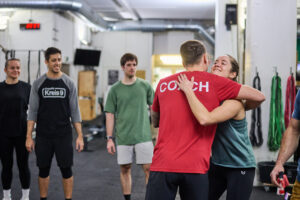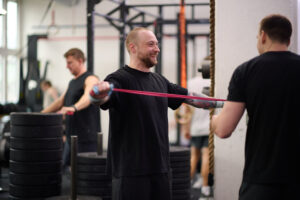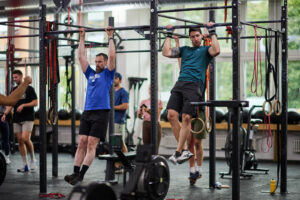
First things first: it is always better not to be exercising while sick. We cannot emphasize this enough, and we do not accept any responsibility for anyone who thinks or does otherwise. Skipping training when you’re not feeling well is the smarter choice—not only for yourself but also for those around you.
Think about it: would you want someone with the flu sweating and coughing next to you in the gym? Training temporarily compromises your immune system, making you more vulnerable to catching whatever your training partner might be carrying. Hard training puts stress on the body, which redirects resources away from your immune defense. If your system is already fighting off a bug, piling extra stress on top can make things worse—for you and for those around you.
Why exercising while sick makes little sense
Here’s another important point: in most cases, training while sick doesn’t bring you any gains. Your body is already busy fighting off illness, which means it cannot adapt properly to the training stimulus. At best, the workout is wasted effort. At worst, it delays recovery or makes the illness worse. So why would you do something that is both useless and potentially harmful?
That being said, there are still valid questions that come up when we talk about training and illness.
When have you rested long enough?
A runny nose can linger for weeks, and a dry cough may seem like it will never go away. So how do you know when it’s safe to get back to training?
- A general rule: if your symptoms are above the neck (mild runny nose, sneezing), light activity may be fine. If your symptoms are below the neck (fever, chest congestion, body aches, stomach issues), it’s time to rest.
- Even when you feel “better,” give your body at least one extra day of rest before returning to full intensity. Your immune system needs the reserve capacity to finish the fight.
What is “exercising”?
Not all activity is the same. A heavy CrossFit workout and a short walk around the block both count as “exercise,” but the stress they place on the body is very different.
- What you should not do: high-intensity workouts, heavy lifting sessions, or anything that leaves you gasping for air or completely drained. These will only prolong your recovery.
- What you can do: light movement, such as walking, mobility work, stretching, or gentle bike rides. These support circulation and may even help you feel better without overtaxing your system.
At CrossFit Kreis 9, our coaches are always ready to help you scale or adapt your training once you come back. That way, you don’t need to decide alone how hard or easy to go—we’ll make sure you’re moving safely.
Getting back to rhythm
For some people, the hardest part of being sick is not the illness itself but the break in routine. Staying away from the gym for a few days can easily turn into weeks—and in some cases, even years. Once the habit is broken, it can feel much harder to return.
That’s why, when your body is ready, it’s better to do something rather than nothing. The goal isn’t to set records but simply to re-establish the habit of showing up.
- Start small. A 10-minute walk, light mobility session, or a short bodyweight circuit is enough.
- Focus on consistency over intensity. It’s about rebuilding rhythm, not crushing workouts.
- Let “showing up” be the win. Even a light session counts as success, because it keeps the chain of your training habit intact.
And what if you’re not sure whether you’re really ready, since some symptoms may still linger? In that case, the right approach is to go back easy. Your first workout won’t feel great—don’t expect it to. The real answer will show itself the next day:
- If you feel the same or better, you can slowly ramp things up.
- If you feel worse, you pushed too soon and need more rest.
At CrossFit Kreis 9 we’ll always encourage you to be patient with yourself, to listen to your body, and to lean on our coaching team for guidance. Your long-term health is worth far more than one workout.
Final thought about exercising while sick
Your health is the foundation of your training. Missing a week because of sickness will not derail your progress—but letting that week turn into months or years might. Respect your body, protect those around you, and remember: recovery is part of training.




